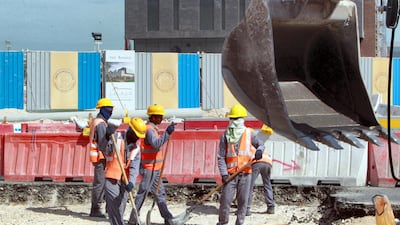Qatar must urgently introduce laws to protect the lives of up to 800,000 migrant construction labourers, Human Rights Watch said on Wednesday.
The report also called on Qatar, where thousands of labourers are working on World Cup 2022 projects, to investigate workers' deaths and make those findings public.
"The Qatari authorities' failure to put in place the most basic protection from the heat, their decision to ignore recommendations that they investigate worker deaths, and their refusal to release data on these deaths, constitutes a wilful abdication of responsibility," said report author Nicholas McGeehan.
He also called on football's world governing body, Fifa, national associations and World Cup sponsors to demand further protection from heat and humidity for Qatar's workers.
McGeehan added: "They should also be demanding answers to two simple questions -- how many workers have died since 2012 and how they have died?"
Qatar has introduced laws to stop people working outside between 11.30am and 3pm annually from June 15 to August 31, when temperatures can reach around 50 degrees Celsius.
But the report said these measures do not go far enough.
"Limiting work temperatures to safe temperatures - not set by a clock or calendar - is well within the capacity of the Qatari government and will help protect hundreds of thousands of workers," said Sarah Leah Whitson.
Temperatures in Qatar are currently in the high 30s Celsius and humidity levels are above 50 per cent.
Human Rights Watch said medical research suggests heat stress is a genuine risk to those working outside, and it has called for greater flexibility by Qatari authorities.
It said the government should follow the example of Qatar's World Cup organisers, who have introduced compulsory work-to-rest ratios introduced for the 12,000 helping build venues for 2022.
"If Qatar's World Cup organisers can mandate a climate-based work ban, then the Qatar government can follow its lead," added Ms Whitson.
However it called for much greater transparency by Doha on the vexed issue of worker deaths.
It said figures were last made available in 2012.
Out of the 520 deaths then for workers from Bangladesh, India and Nepal, 385, or 74 per cent, were "neither explained nor investigated".
The HRW said there had been 10 deaths reported by World Cup organisers between October 2015 and July 2017, eight classified as "non-work related".
The report comes after a Nepalese construction worker in Qatar was "sacked" the day after speaking to a UN delegation visiting the country to examine labour conditions.
The UN's International Labour Organization (ILO) said it would be on the agenda when its governing body meets in two months to discuss an investigation into allegations of forced labour by Qatar.
"The ILO has been following closely this case and continues to do so with a view to ensuring that the rights of this Nepalese worker are fully respected and protected," Corinne Vargha, director of the ILO's international labour standards department, said.
The case was raised in a previous meeting of the ILO governing body in March 2017, Ms Vargha said, in the context of a complaint against Doha for non-compliance with two ratified ILO international conventions - namely the Forced Labour Convention and the Labour Inspection Convention.
"The complaint will be further discussed by the Governing Body at its November 2017 session," she added.
That meeting could see the ILO launch a formal investigation into Qatar over its treatment of migrant workers.
The construction worker's plight has also been confirmed by two separate unions.
The incident occurred in March 2016, but could only now be reported because of sensitivities surrounding the case.
It happened when a six-strong team from the ILO visited a Qatar labour camp.
As well as losing his job after telling the UN body about unpaid wages and employers illegally holding his passport, the labourer was also handed a one-way ticket home to Nepal by bosses, unions said.
Officials at the International Trade Union Confederation (ITUC) say the timing of the dismissal "indicates it was a retaliatory act by his employer".
"This is a violation under international labour standards and contradicts the commitments Qatar has repeatedly made before the ILO," said ITUC head Sharan Burrow.
The union said the 29-year-old worker never left Qatar, but was subsequently jailed for two weeks due to losing his work sponsor and faced a fine of 4,600 Qatari riyals ($1,240).
Under the "kafala" system, the prevailing law at the time of the incident, all foreign workers in Qatar required a local sponsor in order to work and maintain residency.
That sponsor, whether an individual or company, must grant permission for the labourer to switch jobs or leave the country.
The Nepalese national was not working on a World Cup project.
The man's case was cleared earlier this year and he opted to stay in Qatar, working for a new employer and earning around 1,600 Qatari riyals per month.
Qatar's labour ministry said it was aware of the case and all issues had been resolved.
It insisted the case began when the worker left his job in violation of Qatar's residency and employment laws.
"The worker has been granted legal status in Qatar and all financial disputes have been settled with his previous employer.

